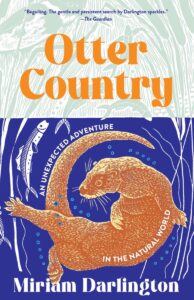 Welcome to the latest installment of “Five words from …” our series which highlights interesting words from interesting books! In this installment, we follow nature writer Miriam Darlington from her home in Devon, England, through the wilds of Scotland, Wales, the Lake District, and the countryside of Cornwall as she pursues a deeper understanding of the enchanting, elusive, and fascinating otter.
Welcome to the latest installment of “Five words from …” our series which highlights interesting words from interesting books! In this installment, we follow nature writer Miriam Darlington from her home in Devon, England, through the wilds of Scotland, Wales, the Lake District, and the countryside of Cornwall as she pursues a deeper understanding of the enchanting, elusive, and fascinating otter.
The wild otter I saw would no doubt be out of the water and making tracks to its own musky holt, to curl belly-upward in a home of roots, peat and rocks.
Otters’ resting-places are also sometimes called lodges or couches.
Lower down, the path joins an old leat, a stone waterway engineered a hundred years ago to carry water to feed the reservoirs and tin mines.
The word ‘leat’ is more commonly found in the south and west of England, and in Wales; the word goit is more common in northern England.
There may be spraint, the otter’s droppings, nearby, and these signs can sometimes form great mounds.
Otter excrement is also sometimes called coke, because it has a black, ashy appearance. For other terms for animal droppings, check out the Wordnik list “Specific Excrement“.
In the twentieth century, sometimes a hunted otter would be trapped in the water by a line of people forming a barrier with poles. This was called a “stickle” and if caught like this the otter was less likely to escape.
In the dramatic conclusion of Tarka the Otter (an inspiration for Darlington’s own otter search), Tarka escapes from between two stickles, killing a hunting hound before swimming free.
From this sniff-level position I get a flash of the bristling vibrissae, the otter’s extravagant whiskers, and in a split second he catches my scent.
The word vibrissa (vibrissae is the plural) comes from a Latin word meaning ‘vibrate’.
Got a book you’d like to see given the “five words from” treatment? Nominate it through this form, or email us!